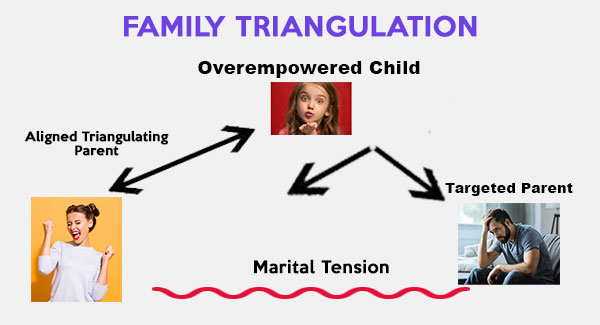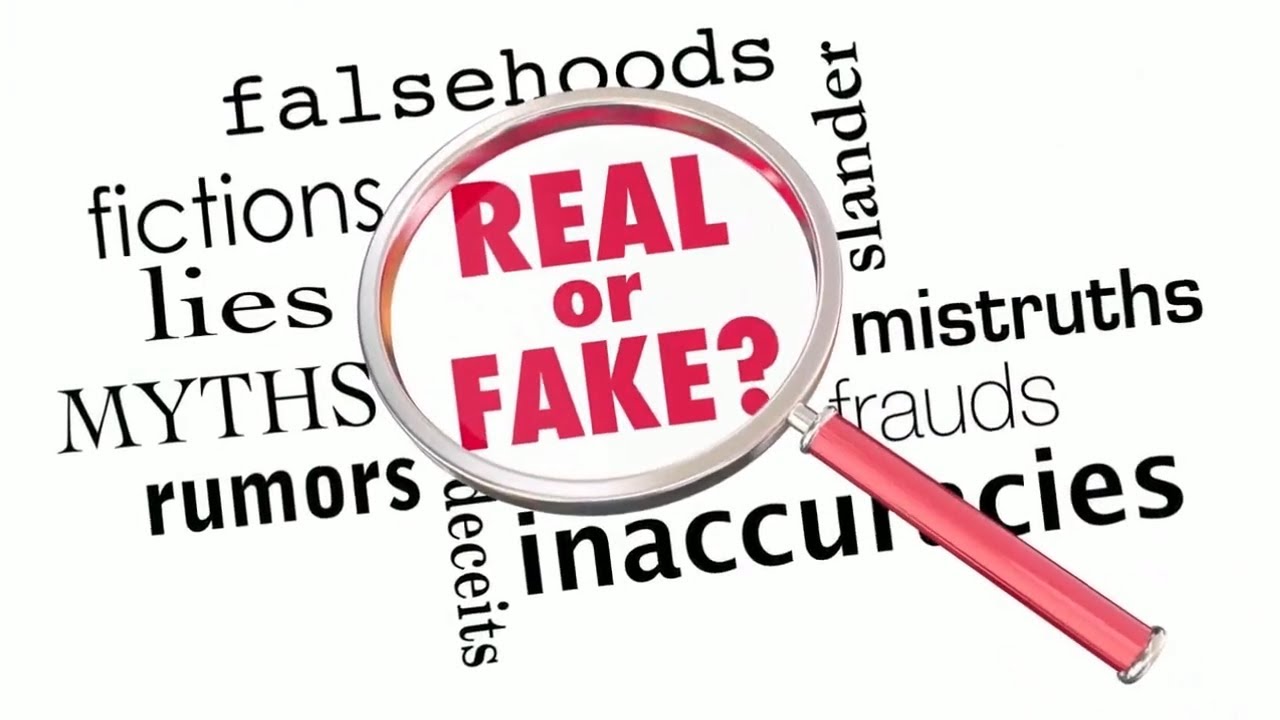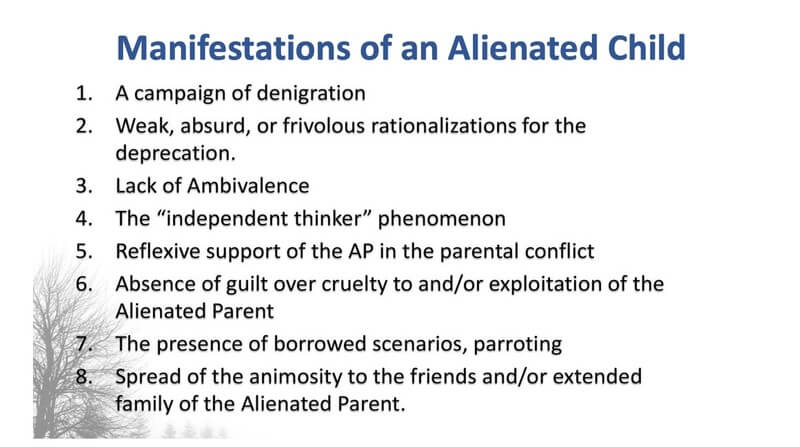Despite overwhelming scientific evidence to the contrary, exceedingly erroneous claims are made about Parental Alienation Syndrome (PAS) and Parental Alienation (PA). It is fabricated that PAS is not a legitimate syndrome and PA is a contrived family phenomenon.
Unqualified bad actors offer opinions about PAS and PA despite lacking appropriate credentials and instead having very biased or self-serving motives. Social media platforms are the preferred medium upon which these bad actors spread the misinformation and disinformation about PAS and PA.
Here you will learn the astonishing and alarming truth and facts about the child-abusive reality of PAS and PA.
Parental Alienation Syndrome Defined
In 1985, child psychiatrist, Richard Gardner, published an article in which he coined the label “PAS.” He gave this label to an exceedingly disturbing, child-abusive phenomenon that he had observed in families undergoing divorce. Gardner described this phenomenon as follows:
The parental alienation syndrome (PAS) is a disorder that arises primarily in the context of child-custody disputes. Its primary manifestation is the child’s campaign of denigration against a parent, a campaign that has no justification. It results from a combination of programming (brainwashing) of the parent’s indoctrinations and the child’s own contributions to the vilification of the target parent. When true parental abuse and/or neglect is present the child’s animosity may be justified, and so the parental alienation syndrome explanation for the child’s hostility is not applicable. (p. xx)

Dr. Gardner observed PAS to create co-morbid psychiatric disorders in the alienated child – sometimes as severe as psychosis.
Parental Alienation Syndrome v. Parental Alienation
Because a syndrome applies to an individual and cannot apply to a relationship, the PAS label makes the child the patient. The child would then carry a mental health diagnosis and would be the primary, if not sole, focus of treatment. PAS also leaves the parents out of the equation.
Parental alienation is a family phenomenon that involves all the family dynamics and interactions. The broader conception of PA as a phenomenon enables observations of the parents as well as the child and assessing all of the family interactions.
Looking at the entire family broadens the assessment. It permits ruling out or in for child abusive and/or neglectful behaviors on the part of the rejected parent.
Looking at the entire family allows for assessing the favored parent for engaging in the 17-alienating behaviors as identified by Baker and Fine (2007).
Looking at the entire family allows for assessing if the favored parent and child are pathologically enmeshed.
Looking at the entire family enables assessment for the presence of the triangulation of the child by a parent to align with that parent against the other parent.

Assessing for parental alienation is accomplished by undertaking of a family systems evaluation to determine the cause of a the child’s rejection of a parent.
The Anti-Syndrome Claim Is Fallacious
The entire hoopla over the erroneous claim that PAS does not meet the definition of a syndrome is based upon an utterly distorted medical definition of a syndrome – so utterly distorted that it makes the medical definition of a syndrome unrecognizable.
This distorted definition was proffered by Kelly and Johnston (2001) in their article, “The Alienated Child: A Reformulation of Parental Alienation Syndrome.” Notice that Kelly and Johnston did to reject the concept of alienation but only reframed it. In this very article, they also accept all eight of Gardner’s symptoms to identify an alienated child.
I provide here the National Institute of Health and The DSM-5 Definitions of a syndrome followed by Kelly and Johnston’s utterly distorted definition.

National Institute of Health & National Library of Medicine Syndrome Definition
“A syndrome is a recognizable complex of symptoms and physical findings that indicate a specific condition for which a direct cause is not necessarily understood.”
The reader should take note that knowing its “cause” is not a requirement of a syndrome.
DSM-5 Syndrome Definition
“A grouping of signs and symptoms, based on their frequent co-occurrence that may suggest a common underlying pathogenesis, course, familial pattern, or treatment selection.” (p.830)
The reader should take note that everything after the word “may” is not required for a syndrome.
Kelly and Johnston’s (2001) Syndrome Definition
Kelly and Johnston’s erroneous DSM syndrome definition is the basis for the anti-syndrome claim:
“Because there is no “commonly recognized, or empirically verified pathogenesis, course, familial pattern, or treatment selection” of the problem of PAS, it cannot be properly considered a diagnostic syndrome of the American Psychiatric Association.” (p. 249)
It is obvious how Kelly and Johnston distorted the DSM definition of a syndrome by stating that the criteria after the word “may” in the actual DSM syndrome definition are required when they are clearly optional. The NIH definition of a syndrome also does not require a known cause.
If Kelly and Johnston’s distorted syndrome definition were the true syndrome definition then countless medical conditions would not have initially qualified as a “syndrome”—just consider AIDS and COVID. Some cancers would still not be considered a syndrome.
The truth is, when a cause is known, then a syndrome becomes a disease.
FURTHER READING: Parental Alienation Syndrome Is a Legitimate Syndrome
Identifying an Alienated Child

Dr. Gardner was the first to publish about eight distinctive, re-occurring and co-occurring symptoms he had observed in a group of children whose parents were undergoing a high conflict custody battle.
Dr. Gardner was not the first and only clinician to note the symptoms under these conditions. Leona Kopetski, a Colorado Custody Evaluator, also noted the same symptoms when undertaking her custody evaluations. The two did not know each other.
The children who manifested these symptoms were note to be unjustifiably, unreasonably, and inexplicably rejecting of a loving and safe parent with whom they had had a normal relationship.
Dr. Gardner defined and labeled this condition in the child as “PAS.” Dr. Gardner further emphasized that diagnosis of PAS also required evidence that the favored parent had been influencing/brainwashing the child to reject the alienated parent.
Dr. Gardner’s 8 Symptoms of an Alienated Child

Descriptions of the Eight Symptoms of an Alienated Child
A severely alienated child will exhibit all or almost all of the eight symptoms on an intense level. Moderately to mildly alienated children will exhibit gradually fewer symptoms with gradually diminishing intensity.
The severity of the diagnosis of an alienated child is therefore determined by the intensity of the child’s expressions of feelings, thoughts, attitudes, and behaviors – primarily with respect to the child’s relationship with each parent.
These symptoms can be observed in the child’s interactions with each parent—that is, in the child’s rigid alignment with the alienating parent against the alienated parent and in the child’s detachment from and rejection of a meaningful, quality, and normal relationship with the alienated parent.
Discussion of the symptoms follow:
Denigration of the Alienated Parent
Alienated children engage in behaviors to maltreat, disrespect, disparage, defy, reject, and even physically abuse the alienated parent.
The child objects to the alienated parent being involved in or having knowledge of any aspect of the child’s life—particularly with respect to medical and educational developments and social activities.
The child makes the alienated parent feel like a persona non grata.

Weak, Frivolous, or Absurd Rationalizations for the Denigration
Alienated children present vague, unproven and disproven complaints about the alienated parent that do not warrant the child overcoming the child’s powerful instinct for survival to have and need a parent meaningfully in the child’s life; the child may also present serious, but meritless, allegations of physical and/or sexual abuse.

Lack of Ambivalence
Alienated children perceive their parents in black-and-white terms: the alienated parent being bad and error-prone, having nothing to offer the child; while the alienating parent is good, with perfect parenting skills and meets all of the child’s every need and desire.

The Independent-Thinker Phenomenon
Alienated children spontaneously volunteer uninfluenced authorship of their negative beliefs, feelings and allegations about the alienated parent, proclaiming that their alienating parent has not influenced them.

Reflexive Support of the Alienating Parent
Alienated children uncritically and dogmatically align with their alienating parent in all, or virtually all, parental disagreements and in the legal proceedings.
Cruelty Towards the Alienated Parent With No Remorse or Guilt
Alienated children express—almost as a badge of honor—feeling no remorse or guilt for having rejected and hurt their alienated parent.

Presence of Borrowed Language or Borrowed Scenarios:
Alienated children sound scripted; employ language, concepts, and terminology beyond their cognitive development; have knowledge of events for which they had not acquired through first-hand experience.

Spread of Animosity to Extended Family and Friends of the Alienated Parent

The denigration is spread to the alienated parent’s extended family—to include a loving stepparent/fiancée, grandparents, aunts, uncles, cousins, etc.—even when there had been a previously close, loving relationship with the child.
Additional Symptoms
In collaboration with colleagues who specialize in alienation, we have identified several additional symptoms that are highly specific for an alienated child – meaning that the symptoms are vertically never seen, if at all, in non-alienated children.
Over-Empowerment

Pathological Enmeshment With the Alienating Parent

Amnesia Regarding a Prior Positive Relationship With the Alienated Parent

Sudden, Inexplicable Rejection of a Relationship With the Alienated Parent

FURTHER READING: Understanding Parental Alienation Syndrome and The DSM-5
Gardner’s Eight Symptoms Meet the Medical/DSM Criteria of a Syndrome
There are compelling, scientific arguments disputing the claim that PAS does not qualify as a syndrome.
The eight symptoms of an alienated child irrefutably qualify as a syndrome. That is, when you see the occurrence of one of the symptoms in a child whose parents are engaged in a contentious custody battle, you tend to see the occurrence of all or most of the them.
In the 40 years since Gardner published about the eight symptoms, not a single peer-reviewed research study shows that the eight symptoms appear in any other group of children. They do not manifest in non-alienated children of divorce or separation; they do not manifest in adjudicated abused children.
Not a single study has been produced to falsify the eight symptoms. Surely such a study would have been produced in all this time if the symptoms had been found to have poor specificity – meaning they have a significant false positive rate. In fact, research reveals just the opposite – that the manifestations have an error rate of <1%.

In my own evidence-based practice, I did not observe a single symptom – let alone a cluster of them – in any of the 3000 abused and neglected foster children with whom I had worked. If non-alienated children were to manifest these symptoms surely I would have expected to see them in those 3000 foster children.
I further did not see any of the manifestations in the 1000 non-alienated children of divorce with whom I directly treated.
Gardner’s eight symptoms so clearly meet the true DSM syndrome definition that they are highly relied upon in the scientific community to identify an alienated child.
FURTHER READING: Manifestations of Alienated Children – As Seen by an Expert
Conclusion
There is no validity or merit to the claims that Parental Alienation Syndrome and Parental Alienation are fictitious phenomena. Those who proffer these fictions have malicious, self-serving, or biased agendas which are harming and exploiting children.
To deny that alienated children exist – estimated to be 250,000 in the US alone – is perpetuating the child abuse being inflicted upon them by their alienating parent. This is an unforgivable and irresponsible yet avoidable catastrophe given the science that so accurately identifies an alienated child.


